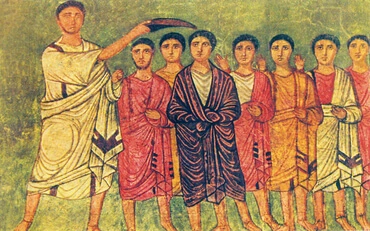1
Then Jonah made prayer to the Lord his God from the inside of the fish, and said,
2
In my trouble I was crying to the Lord, and he gave me an answer; out of the deepest underworld I sent up a cry, and you gave ear to my voice.
3
For you have put me down into the deep, into the heart of the sea; and the river was round about me; all your waves and your rolling waters went over me.
4
And I said, I have been sent away from before your eyes; how may I ever again see your holy Temple?
5
The waters were circling round me, even to the neck; the deep was about me; the sea-grass was twisted round my head.
6
I went down to the bases of the mountains; as for the earth, her walls were about me for ever: but you have taken up my life from the underworld, O Lord my God.
7
When my soul in me was overcome, I kept the memory of the Lord: and my prayer came in to you, into your holy Temple.
8
The worshippers of false gods have given up their only hope.
9
But I will make an offering to you with the voice of praise; I will give effect to my oaths. Salvation is the Lord's.
10
And at the Lord's order, the fish sent Jonah out of its mouth on to the dry land.







